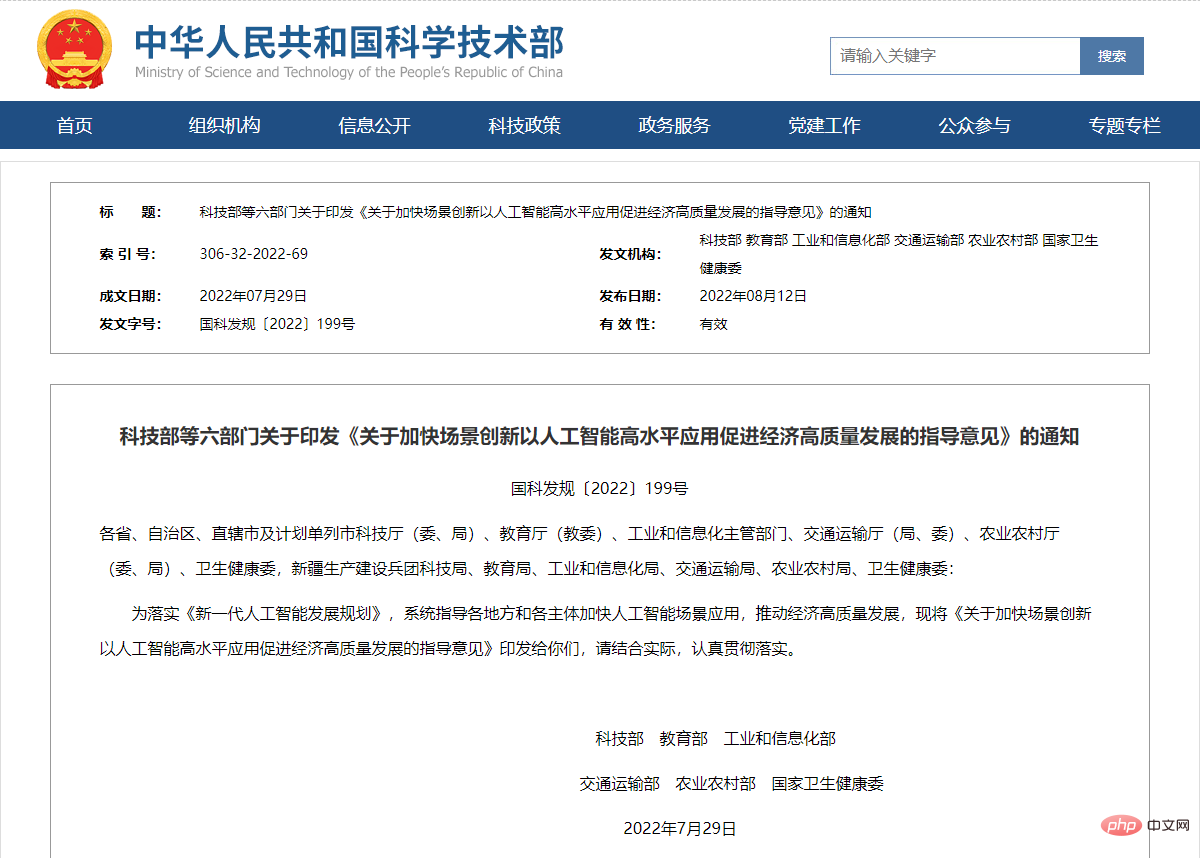
Recently, in order to implement the "New Generation Artificial Intelligence Development Plan" and systematically guide all localities and entities to accelerate the application of artificial intelligence scenarios and promote high-quality economic development, the Ministry of Science and Technology, the Ministry of Education, the Ministry of Industry and Information Technology, and the Ministry of Transport Six departments of the Ministry of Agriculture and Rural Affairs and the National Health Commission jointly issued the "Guiding Opinions on Accelerating Scenario Innovation and Promoting High-Quality Economic Development through High-level Application of Artificial Intelligence" (hereinafter referred to as the "Opinions").

The "Opinions" pointed out that scenario innovation is a process that is guided by the creative application of new technologies and uses the linkage of supply and demand as a path to achieve iterative upgrading of new technologies and rapid industry growth. Promoting innovation in artificial intelligence scenarios is of great significance to promoting higher-level applications of artificial intelligence and better supporting high-quality development. The rapid development of my country's artificial intelligence technology, the increasingly abundant data and computing resources, and the continuous expansion of application scenarios have laid a solid foundation for innovation in artificial intelligence scenarios. However, there are still problems such as insufficient understanding of scene innovation, insufficient design of major scene systems, insufficient openness of scene opportunities, and imperfect scene innovation ecology. It is necessary to strengthen the overall guidance of artificial intelligence scene innovation work.
1. Create major scenarios around the cultivation of high-end and efficient intelligent economy. Encourage in-depth exploration of artificial intelligence technology application scenarios in key industries such as manufacturing, agriculture, logistics, finance, commerce, and home furnishing to promote the high-end and efficient development of the smart economy. In the manufacturing field, priority is given to exploring intelligent scenarios such as industrial brains, robot-assisted manufacturing, machine vision industrial inspection, and equipment interconnection management. In the agricultural field, priority is given to exploring intelligent scenarios such as automatic driving operations of agricultural machinery satellite navigation, agricultural geographical information engines, online agricultural machinery booking, rubber tree tapping, smart farms, digital management of the industrial chain, drone plant protection, agricultural production IoT monitoring, and agricultural product quality and safety control. In the logistics field, priority is given to exploring intelligent scenarios such as robot sorting, material handling, intelligent three-dimensional warehousing, and traceability terminals. In the financial field, priority is given to exploring intelligent scenarios such as big data financial risk control, enterprise intelligent credit reporting, and intelligent anti-fraud. In the business field, priority is given to exploring intelligent scenarios such as multi-person online collaborative meetings, online exhibitions, and inventory settlement. In the home furnishing field, priority is given to exploring smart scenarios such as home smart interconnection, building smart monitoring, and online product design. In the consumer sector, we are actively exploring emerging scenarios such as unmanned container retail, unmanned supermarkets, and smart shopping guides. In the field of transportation, priority will be given to exploring intelligent application scenarios of autonomous driving and intelligent shipping technologies in park transportation, ferry connections, intelligent distribution, truck platooning, port container transportation, intelligent port operations, and autonomous ship navigation.
2. Create major scenarios around the construction of a safe, convenient and intelligent society. Oriented towards a smarter city and a more considerate society, we will continue to explore opportunities for artificial intelligence application scenarios in the fields of urban management, traffic management, ecological environmental protection, medical health, education, and elderly care, and carry out demonstrations of smart social scenario applications. In the field of urban management, we explore scenarios such as urban brain, urban IoT perception, availability of invisible government data, and digital procurement. In the field of traffic management, we explore scenarios such as traffic brains, smart roads, smart parking, autonomous driving, smart ports, and smart waterways. In the field of ecological and environmental protection, the focus is on exploring scenarios such as intelligent environmental monitoring and autonomous drone inspections. The smart community field explores future communities, unmanned delivery, community e-commerce, digital restaurants and other scenarios. The medical field actively explores scenarios such as intelligent auxiliary diagnosis of medical imaging, auxiliary decision support for clinical diagnosis and treatment, medical robots, Internet hospitals, intelligent medical equipment management, smart hospitals, and intelligent public health services. The field of education actively explores online classrooms, virtual classrooms, virtual simulation training, virtual teaching and research rooms, new teaching materials, teaching resource construction, smart campuses and other scenarios. The field of elderly care is actively exploring scenarios such as home smart monitoring and smart wearable device applications. In the rural sector, we are actively exploring scenarios such as rural smart governance, digital rural housing, and online government services.
3. Create major scenes around high-level scientific research activities. Promote artificial intelligence technology to become a new paradigm for solving major scientific problems in the fields of mathematics, chemistry, geoscience, materials, biology and space science, and give full play to the role of artificial intelligence technology in literature data acquisition, experimental prediction, result analysis, etc. Focusing on the fields of new drug creation, genetic research, biological breeding research and development, new materials research and development, deep space and deep sea, etc., we plan the application scenarios of artificial intelligence technology based on demand, integrate artificial intelligence model algorithms and domain data knowledge, and realize the realization of major scientific problems and discoveries. Research breakthrough.
4. Create major scenes around major national events and major projects. In major events and important conferences such as the Asian Games, National Games, China International Import Expo, and Trade in Services Fair, expand artificial intelligence application scenarios and provide testing and verification opportunities for artificial intelligence technology and product applications. Encourage the use of artificial intelligence technology in major construction projects such as strategic backbone corridors, high-speed railways, port and shipping facilities, and modern airport construction to improve the construction efficiency of major projects.
The above is the detailed content of Six departments create four major application scenarios for artificial intelligence. For more information, please follow other related articles on the PHP Chinese website!




